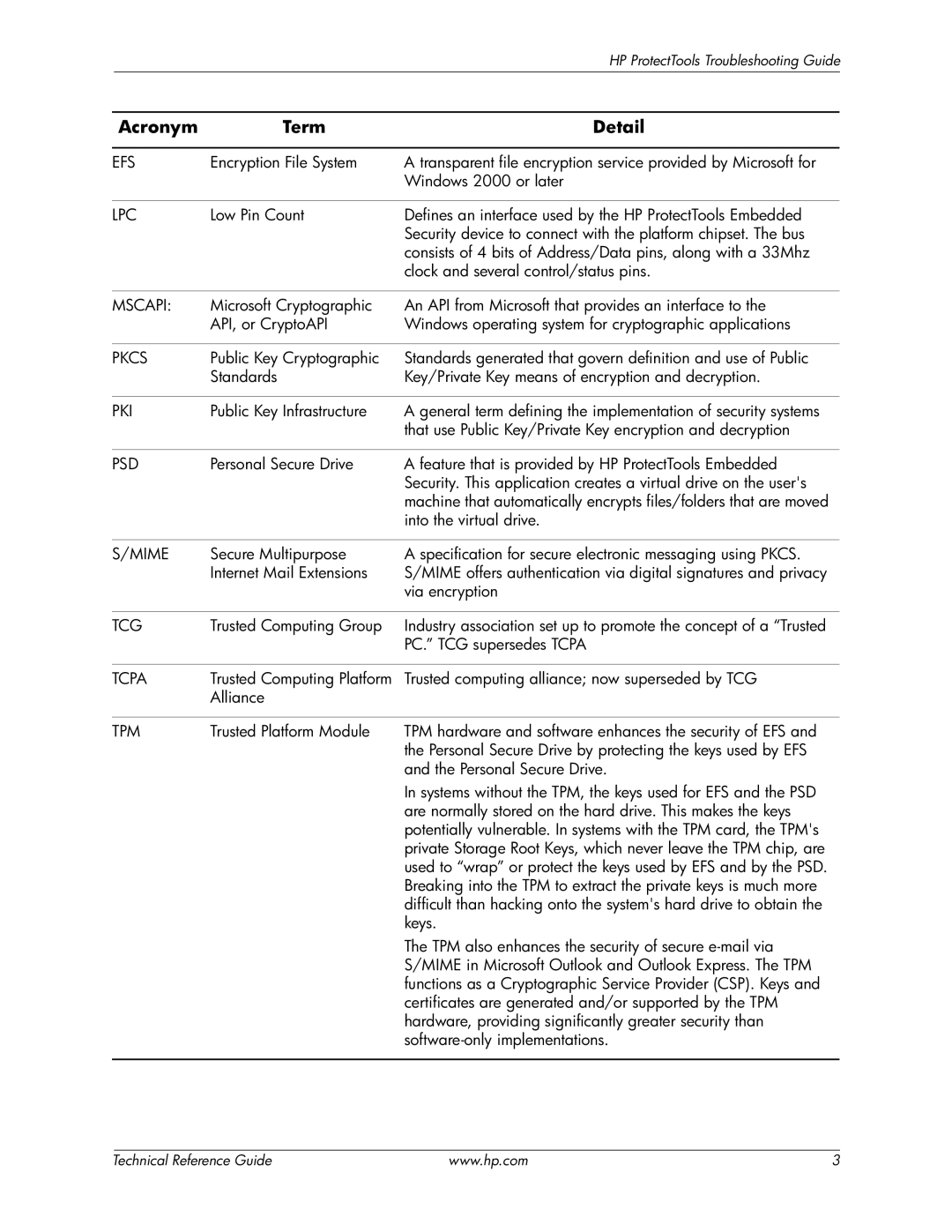|
|
| HP ProtectTools Troubleshooting Guide |
|
|
|
|
| Acronym | Term | Detail |
|
|
| |
EFS | Encryption File System | A transparent file encryption service provided by Microsoft for | |
|
|
| Windows 2000 or later |
|
|
| |
LPC | Low Pin Count | Defines an interface used by the HP ProtectTools Embedded | |
|
|
| Security device to connect with the platform chipset. The bus |
|
|
| consists of 4 bits of Address/Data pins, along with a 33Mhz |
|
|
| clock and several control/status pins. |
|
|
| |
MSCAPI: | Microsoft Cryptographic | An API from Microsoft that provides an interface to the | |
|
| API, or CryptoAPI | Windows operating system for cryptographic applications |
|
|
| |
PKCS | Public Key Cryptographic | Standards generated that govern definition and use of Public | |
|
| Standards | Key/Private Key means of encryption and decryption. |
|
|
| |
PKI | Public Key Infrastructure | A general term defining the implementation of security systems | |
|
|
| that use Public Key/Private Key encryption and decryption |
|
|
| |
PSD | Personal Secure Drive | A feature that is provided by HP ProtectTools Embedded | |
|
|
| Security. This application creates a virtual drive on the user's |
|
|
| machine that automatically encrypts files/folders that are moved |
|
|
| into the virtual drive. |
|
|
| |
S/MIME | Secure Multipurpose | A specification for secure electronic messaging using PKCS. | |
|
| Internet Mail Extensions | S/MIME offers authentication via digital signatures and privacy |
|
|
| via encryption |
|
|
| |
TCG | Trusted Computing Group | Industry association set up to promote the concept of a “Trusted | |
|
|
| PC.” TCG supersedes TCPA |
|
|
| |
TCPA | Trusted Computing Platform | Trusted computing alliance; now superseded by TCG | |
|
| Alliance |
|
|
|
| |
TPM | Trusted Platform Module | TPM hardware and software enhances the security of EFS and | |
|
|
| the Personal Secure Drive by protecting the keys used by EFS |
|
|
| and the Personal Secure Drive. |
|
|
| In systems without the TPM, the keys used for EFS and the PSD |
|
|
| are normally stored on the hard drive. This makes the keys |
|
|
| potentially vulnerable. In systems with the TPM card, the TPM's |
|
|
| private Storage Root Keys, which never leave the TPM chip, are |
|
|
| used to “wrap” or protect the keys used by EFS and by the PSD. |
|
|
| Breaking into the TPM to extract the private keys is much more |
|
|
| difficult than hacking onto the system's hard drive to obtain the |
|
|
| keys. |
|
|
| The TPM also enhances the security of secure |
|
|
| S/MIME in Microsoft Outlook and Outlook Express. The TPM |
|
|
| functions as a Cryptographic Service Provider (CSP). Keys and |
|
|
| certificates are generated and/or supported by the TPM |
|
|
| hardware, providing significantly greater security than |
|
|
| |
|
|
|
|
Technical Reference Guide | www.hp.com | 3 |
